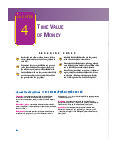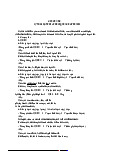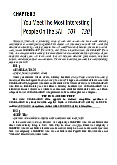


Preview text:
REPORTED SPEECH: TIME ASPECTS
When the reporting VERB (SAY, THINK, ASK, etc.) is in the Past Tense, the "original"
statement/idea or question may be modified. VERB IN REPORTED NOUN CLAUSE
When the reporting verb in the main clause is in the Past Tense, the verb in the noun clause is usually
also in the Past Tense, even when the original statement or idea was in the Present Tense.
Here are some examples to show the differences between direct speech/quotation and indirect/reported speech.
DIRECT SPEECH / INDIRECT/REPORTED SPEECH Present Tense / Past Tense
Ann: "I'm happy." (DIRECT SPEECH)
She told me she was happy. (INDIRECT/REPORTED SPEECH)
Tom: "I like bananas." (DIRECT SPEECH)
He said he liked bananas. (INDIRECT/REPORTED SPEECH)
The Browns: "We're enjoying the concert." (DIRECT SPEECH)
They said they were enjoying the concert. (INDIRECT/REPORTED SPEECH)
Ann: "Where do you live?" (DIRECT SPEECH)
She asked me where Ilived (INDIRECT/REPORTED SPEECH).
Past Simple/Present-Past Perfect / Past Perfect
Frank: "She went home." (DIRECT SPEECH)
He said she had gone home. (INDIRECT/REPORTED SPEECH)
Jane: "He's been arrested." (DIRECT SPEECH)
She said he had been arrested. (INDIRECT/REPORTED SPEECH)
Mr. Selden: "Why had they invited me?" (DIRECT SPEECH)
He asked why they had invited him. (INDIRECT/REPORTED SPEECH) Modals / Past Modals
Tim: "I can't swim." (DIRECT SPEECH)
He said he couldn't swim. (INDIRECT/REPORTED SPEECH)
Marsha: "I may be late." (DIRECT SPEECH)
She said she might be late. (INDIRECT/REPORTED SPEECH)
Paul: "Will you try to do it?" (DIRECT SPEECH)
He asked if I would try to do it. (INDIRECT/REPORTED SPEECH) PRONOUNS
Pronouns must be changed to fit the reported statement. EXAMPLES:
Tom: "I bought my girlfriend a pin for her birthday."
Tom said that he'd bought his girlfriend a pin for her birthday.
Alice: "Can I borrow your car?"
Alice asked me if she could borrow my car. TIME ADVERBIALS
When the reporting verb is in the Past Tense "time adverbials" may also change. DIRECT - INDIRECT/REPORTED NOW - THEN/AT THAT TIME Ali: "I live in Paris now."
He said he lived in Paris then/at that time. TODAY - THAT DAY/THE SAME DAY
The Workers: "We're going to finish the job today."
They told us they were going to finish the job that day/the same day.
TOMORROW - THE NEXT/FOLLOWING DAY
Toshio and Kumi: "We'll see you tomorrow."
They said they'd see us the next/following day.
NEXT WEEK, etc. - THE NEXT/FOLLOWING WEEK, etc.
Mr. Edison: "We can go to Rio next year."
He said they could go to Rio the following year. YESTERDAY - THE DAY BEFORE
Ada: "I couldn't come yesterday."
She said she hadn't been able to come the day before.
LAST WEEK, etc. - THE WEEK, etc. BEFORE
Alex: "I sent you that letter last month."
He claimed he'd sent us the letter the month before. THE/THIS/THESE - THAT/THOSE
Maria: "I can't believe these stories."
She told us she couldn't believe those stories.
Pedro: "I like that picture near this window."
He said he liked the picture near that window. HERE - THERE
Paul: "I'm going to wait here."
He said he was going to wait there.



